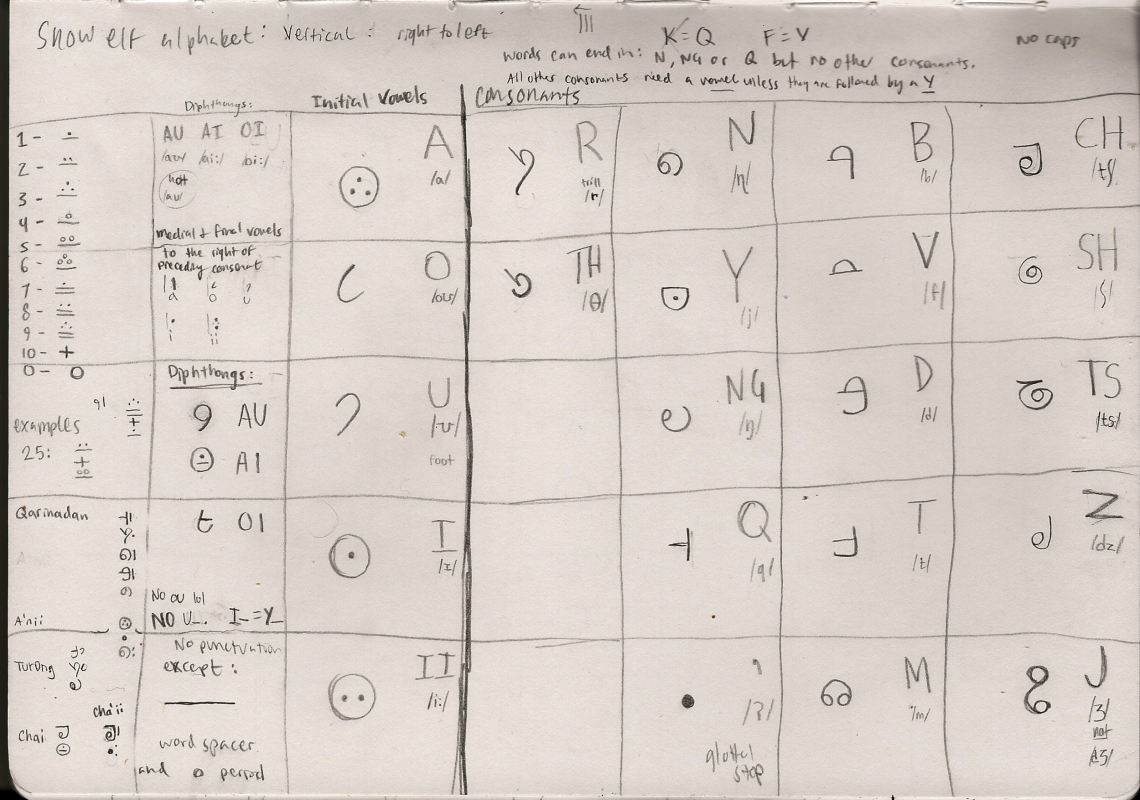Anthologica Universe Atlas / Universes / Karmador / Elvish / Air / Tundra Elvish / Tundra Phonology and Alphabet

My favorite of the alphabets...
Non-final consonants require vowels unless followed by the letter Y. Final consonants are q, n and ŋ.
There is only one lengthened vowel and that is ii. No aa, no oo, no uu, no (ɪ:)
There are three diphthongs: Au (ɑʊ), Ai (ɑi:), Oi (oi:). U and Long I are never followed by a vowel.
Short I is technically a letter that can precede vowels but these are always written with the consonant Y— ya, yo, yu instead of ia or iu. There is no Yii, it is written as Long I, but Yi (jɪ) can be written. Yi (jɪ) and Short I (ɪ) are separate sounds.
The exception to vowels following vowels is if there is a glottal stop between them as the glottal stop counts as a consonant, so if there are two repeating vowels or what appears to be a nonstandard diphthong, it can be assumed the sounds are separated by a glottal stop.
"Quq" is written as Q+diacritic u+Q, "qu'a" is written as Q+diacritic u+Glottal Stop+diacritic a, "qii" is Q+diacritic long i, "qya" is Q+Y+diacritic a, and "qai" is written as Q+AI*.
Doubled consonants are written with a dot to the left of the applicable consonant (which is not shown on the picture above.) But! Depending on personal preference cch, tts, zz, bb, dd, tt and qq can be written with a glottal stop preceding the letter being doubled. Glottal stops themselves cannot be doubled. Romanizing doubled consonants in Tundra works just like in Moon, either writing the consonant twice or using an underdot.
*The three accepted diphthongs have their own letters and are not written with diacritics.
Alphabet is vertical right to left.
Spacer between words, periods ending sentences.
Consonants:
Sh/sh (ʂ)
Ch/ch (ʈ͡ʂ)
S/s or Ts/ts (ts)
Z/z (dz)
J/j (ʐ)
B/b (b)
V/v (ɸ)
D/d (d)
Th/th (θ)
T/t (t)
M/m (m)
N/n (ɳ)
Ŋ/ŋ (ŋ)
Y/y (j)
Q/q (q)
' (ʔ)
R/r (trill)
Vowels:
Long:
Ii or Í/í (i:)
Short:
A (ɑ)
O (o)
U (ʊ)
I (ɪ)
Note:
The Letter Long I is rarely used, but some older people may use it in place of Y. Otherwise its only real use is standing alone, or if it is used at the beginning of a word. For example Iiqu would be written with the letter Long I, but as mentioned above Long I is never followed by a vowel, so you cannot write Iiaqu—though Yaqu is fine.
